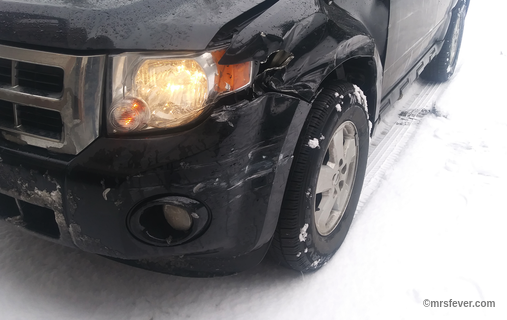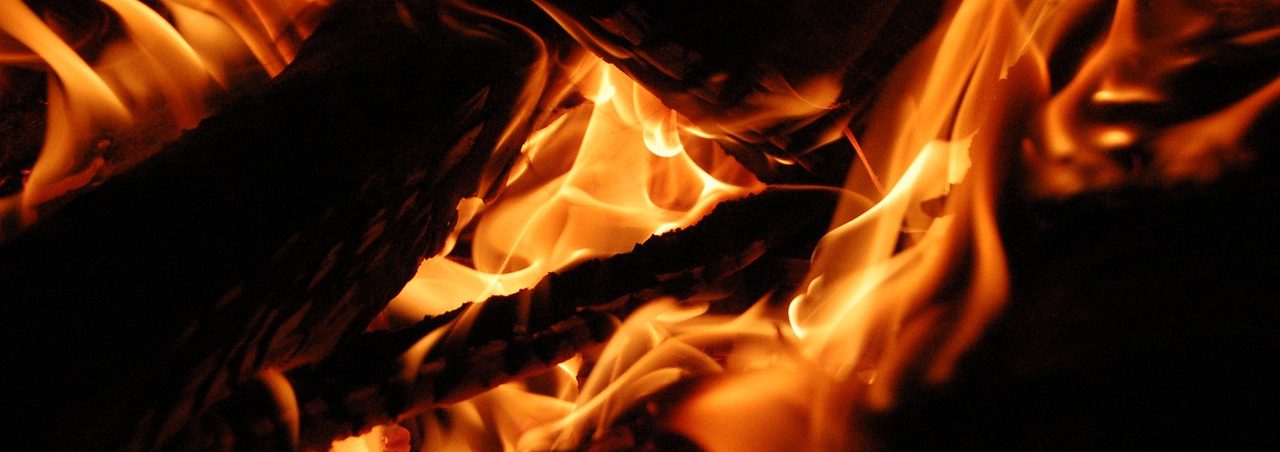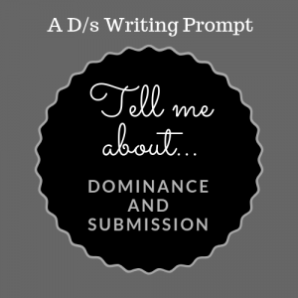
I remember the slowing of time. The realization that, as I crested the rollercoaster-steep descent of that last hill — unable to slow down, brakes anti-locking and tires sliding over a fresh slick layer of snow covering a week’s worth of packed-by-drive ice — I was about to crash. That despite all my years of driving experience, my carefulness in the snowy conditions, my slow speed, my knowledge of the terrain, my deference to the danger… Despite all that… I was about to crash.
It was a matter of seconds.
A matter of the car in front of me — a little 1980s sports coupe with somebody at the wheel who had no business being out driving in the snow — creating another obstacle, a matter of said obstacle combined with the T in the road giving me no option but to go right instead of left (if I could have gone left, I probably would have made it), a matter of inexperienced and unprepared municipalities not having cleared the roads, a matter of heavy body and four-by chassis and sturdy metal guardrail held up by driven-deep wood-stake pilings.
It was a matter of no choice, of remember-your-upbringing, of surrounding circumstances preventing any better option.
And I crashed.
Sometimes relationships are like that.
You get comfortable. You think you know where you’re going and how to get there, comfortable in the driver’s seat because you’re familiar with the terrain — you’ve been down this road before, after all.
But there’s been a storm. One that’s altered the landscape and made the conditions treacherous.
To drive on ahead before the roads have cleared and in the midst of another storm laying down a second layer of slippery stuff is dangerous.
But you do it anyway, because you can handle it, right? You know what you’re doing, you have lots of practice, and of course there is work to be done — that’s why you’re out in these conditions in the first place, right? There is work to be done and you’re the one to do it – people know they can count on you to do it – and so you go. You drive through the mess, heeding the call of others’ expectations, without stopping to think a moment about what you’re expecting of yourself by doing so.
I expected, on that drive through the snow, to make it home safely.
I expected that my years of experience would see me through any difficulty I encountered.
Encountering other people on the road who had no business being there and no skills to navigate the conditions never entered my mind.
Experiencing an uncontrollable slide on un-plowed and un-sanded roads is something I did not expect; there are people responsible for managing the roads, after all — I expected them to have done their job.
I should have expected the unexpected.
I expected, on my travels through the unkept roads of sexual exploration and multi-amory, that I would remain safe.
Physically and emotionally secure in my primary relationship, I thought my years of experience — experience with experimentation, with figuring him out, with communicating — would see me painlessly through any difficulties we encountered.
Encountering other people on the roads we were traversing — people who presented a danger — never occurred to me.
Experiencing the loss of traction and white-knuckling the scary slides in unsafe directions is not something that occurred to me as a possibility until I had hit that rollercoaster crest; that other people would not exercise due diligence or not adhere to basic ‘maintenance’ — respecting boundaries, making sure the road was clear before setting out to travel down it — was uncomfortably eye-opening for me. I expected that others would be careful. That they would not go out if they shouldn’t/weren’t-ready/unskilled/incapable. I expected, in essence, that they would do their job.
I should have expected the unexpected.
We have a lot of expectations — of our own abilities, of our capacity for taking on ever more, of how things ‘should’ work — that are not so much bolded in title caps, THESE ARE MY EXPECTATIONS, but rather, hidden in 6-point font somewhere in the footnotes.
But it is from those expectations — from those tiny experiences that accumulate over time, from which the thesis of our lives are derived — that we venture forth to compose new chapters through the years.
And it is because of those expectations being upset that we learn to set new ones.
So while it is all well and good to use clear language for communication and to discuss the what-ifs and to have rules in place around how you will handle certain situations… Really… When it comes down to it… Those are things that will help you manage the things you expect might happen.
Managing expectations is a whole ‘nother ball game.
And it’s one you can easily strike out on if you don’t understand one simple thing:
In love — as in life — it’s best to expect the unexpected.
It’s the only way to avoid crash conditions.


Just great advice here- I agree – whole heartedly – expect the unexpected! Yep – that has hit me between the eyes b4. As usual great writing.
May x
May More recently posted…Hell in a Hand Basket Part 2 ~ The Word
Just when we think we have everything under control, we find out otherwise. We get complacent and comfortable and even confident in our ability to handle whatever comes our way… until the thing we know we should be able to deal with becomes the thing we can’t do a damned thing about other than to watch the inevitable happen – then hope like hell that once it does, it’s not going to be all that bad or unrepairable.
Some things can be fixed; some things just cannot be fixed and now it’s all about doing our best to not let things get that broken and still the unexpected can show up and shake everything up and give us a cold, sometimes hard, slap in the face; whether it’s a fender bender… or anything else.
Here’s hoping you didn’t write that with a cervical collar holding up your head.
(Been there, done that, not worth the t-shirt.)
Jz recently posted…My Fickle Fictional Heart
Haha! NO.
The crash was not recent, nor was I injured when it happened. 🙂
OH this was a very insightful post. So well written I enjoyed it tremendously!
You nailed it… the metaphor is perfect and sadly apt. I used to liken it to walking through a familiar landscape then suddenly it’s NOT… at the beginning, nothing you can actually pin down, nothing BLATANT or really obvious, but subtle but real changes, slightly changing a familiar landscape, altering the curve of a path, new growth in a thicket of trees, the insidious choking of goutweek on a beloved tree, unseen until the damage has been done… been there, done that, living with it. Beautiful y put.
selkie recently posted…Daybreak
Great post–and the unexpected always shows up when you don’t expect it. Usually at the worst possible time, but adjusting and creating new expectations from the crash is the only way forward it seems.
Of course, you can’t expect the unexpected. If you could, it wouldn’t be unexpected anymore. It seems to me that the only way to protect yourself is to add layers of armor. This could be limiting exposure to others, or expecting less from other people. It’s painful to see people who have locked themselves away from life as a way to avoid the unexpected. I’ve always depended on my ability to recover. That way, when the unexpected happens, I will find a way to survive and maybe flourish.
Nice post!
Caged Lion recently posted…Sexual Charity
What a great post, Feve, and yes, it’s better to always expect the unexpected, even though I understand that sometimes it’s just so easy to settle in for what we know and expect.
~ Marie
Your post gave me a lot to think about and I loved your analogy. I do agree that we can see and think of things in terms of our own abilities and don’t always expect the curve glass which come our way. Very s insightful and interesting. Thank you for linking up to Tell Me About. Missy x
missy recently posted…Great Expectations, and those which are not so great.
We don’t know what our own blind spots are (which is why they are called blind spots!), so we think we have all the bases covered… Except we can only cover the bases we *know* are there.
I try — though I’m not always good at it — to discuss the “what-ifs” I can predict, but also to say, “Something else might happen that I haven’t thought of.”
It doesn’t prevent the car from sliding downhill (so to speak), but it makes it less scary to deal with and improves reaction time when it happens. 🙂